Startpage Search Engine launches Privacy Protection extension
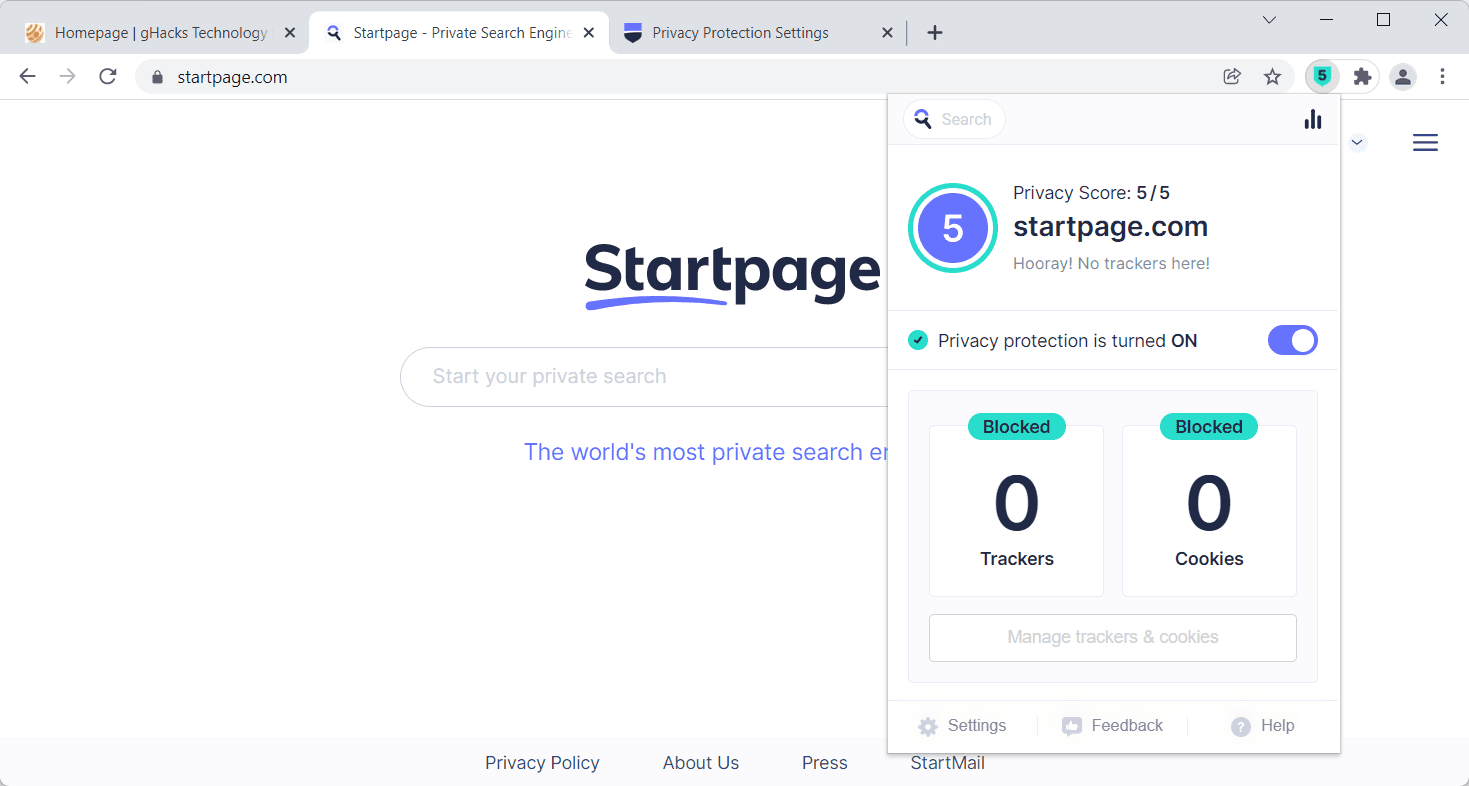
Startpage Privacy Protection is a new browser extension by the privacy-focused search engine Startpage with two main purposes: reveal privacy scores of visited websites and give users more privacy-related controls to reduce or eliminate tracking.

Startpage released the extension for Firefox and Chrome officially, but it installs in compatible browsers, e.g. Microsoft Edge, Vivaldi, Opera or Brave, as well without issues.
Note: The installation of the extension changes the default search engine of the browser to Startpage Search. There is no way to block the change from happening.
Once installed, you may start interacting with the extension by activating its icon. On Chrome and Chromium-based browsers, you may need to click on the general extension icon in the main toolbar of the browser and select the pin option to pin the Startpage extension icon to the toolbar for better visibility. The first click opens a wizard that walks you through main program features.
Startpage Privacy Protection displays a privacy score for each site you visit. It ranges from 1 to 5, with 5 being the best and 1 being the worst. Blocked trackers and cookies are revealed in the interface, and a click on the manage link opens a detailed view of them in the extension's interface.
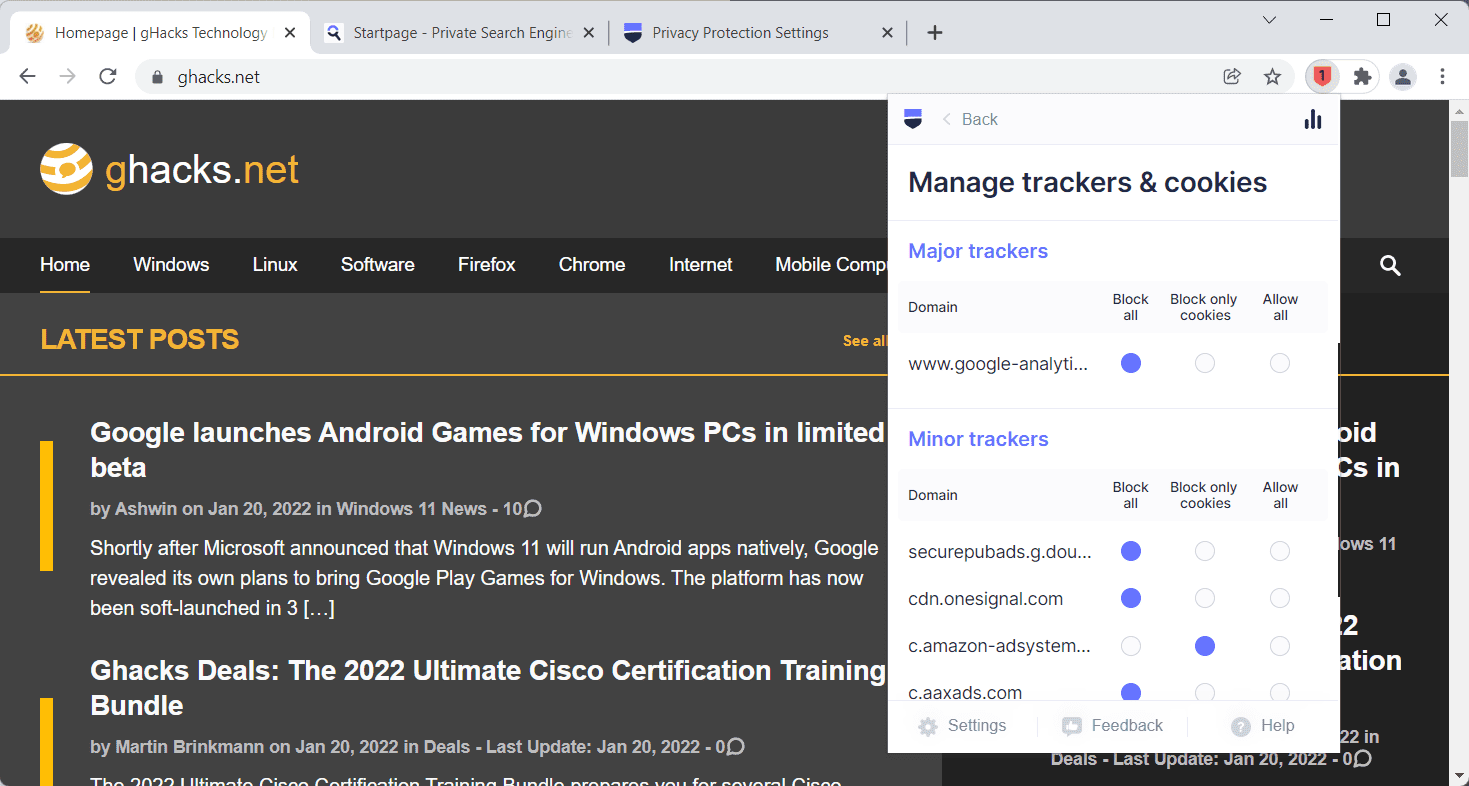
Each tracker has three options: block all, block only cookies, allow all. It is easy enough to switch between the options, e.g., when a site's functionality is reduced by the blocking, or when there are false positives on a site. Most trackers are blocked outright by Startpage Privacy Protection, some have only their cookies blocked.
The main interface has a switch to turn off the main functionality. A click on the settings button displays several options, which are all enabled by default:
- Global Privacy Control -- Sends Global Privacy Control and Do Not Track signals to all websites.
- Hyperlink auditing -- blocks link tracking using the technology.
- Prefetching -- blocks the browser from prefetching data.
The next section, called allowlist, gives you an option to add sites to the exclusion list. Sites added there won't have their trackers and cookies blocked by the extension. Just add the main domain name and the extension will do the rest.
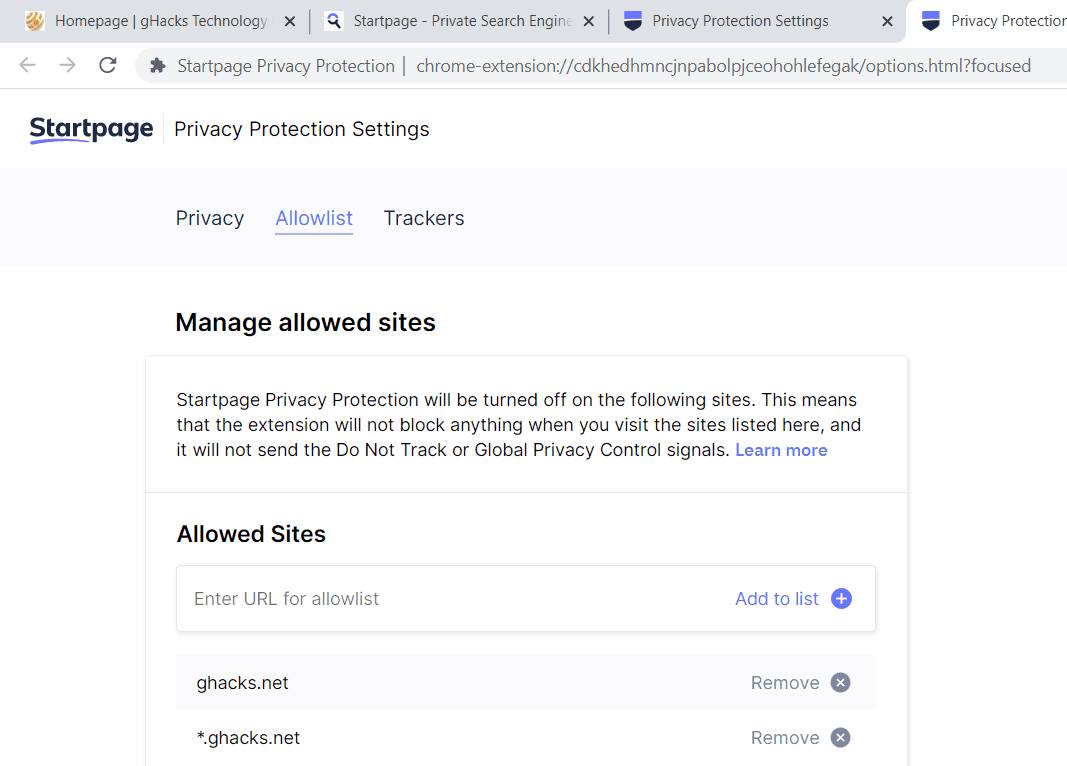
The privacy score of allowed sites is still computed and displayed by the extension, but no blocking is taking place in that case.
The last section lists all known trackers that Startpage's extension knows about in the current version. Here you may change defaults for each individual tracker.
Closing Words
Startpage Privacy Protection blocks trackers and cookies when it is active. The privacy score may be useful to inexperienced users who never looked into privacy closely before.
The extension has a few limitations. One being that it changes the default search engine to Startpage, something which not all users may want. It is not possible to switch the search engine after installation of the extension, unless the extension is disabled. Startpage Privacy Protection lacks options to add trackers to the list it supports. Lastly, it may not block too many ads on the Internet, as its focus is on trackers.
Now You: have you tried the extension?














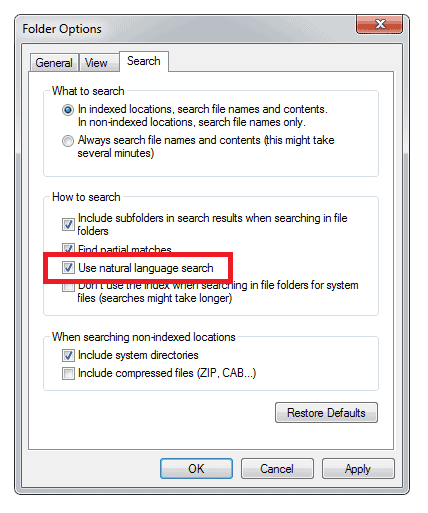
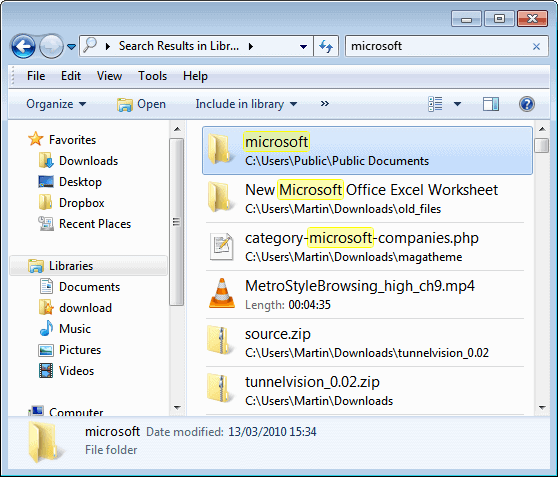









I think that there is no way that we are going to be a truly 100% trusted search engine because
1. We demand good search engine, and the entire internet is basically propped up by search engines that index pages. And we have come to expect that search engines come free.
2. Search engine development needs funds, and good and sustained search engine development efforts need a lot of funds. Under-funded efforts = poor search engines.
3. Company owning search engines need to monetize the effort one way or another. The only way seems to be data sales, or ads.
We have to compromise and not rely on search engine privacy as the only layers in our privacy armor.
Try a searX metaseach instance, several available (not sure all are recomandable); I personally appreciate this very instance i’ve been using for years : https://metasearch.nl/
All searX instances : https://searx.space/
You’ll get (depending on your options), results from Google, Startpage, DuckDuckGo, etc etc, within categories (web, images, news, videos …), all called by searX, you remain known but by searX. It’ll take 1-3 seconds to deploy results given they’re fetched from engines you’ve chosen (or default). You can as well select predefined skins (light, dark), infinite scrolling (à la DuckDuckGo) and much more. I’d say, if the instance fullfils its responsibilities, searX is the best option for an everyday, default search engine.
System1 owns StartPage now. Talk about contradictions.
Privacy on the InterWeb is ongoing illusion and delusion.
The more one tries, the more noticeable on becomes.
Martin duckduckgo or startpage which do you recommend
@ Mia:
Excellent information and analysis regarding alternative search engines (including DDG and Startpage), focused on privacy and returning useful search results, is available on the following sites:
1.) https://www.privacytools.io/#search
2.) https://privacyguides.org/search-engines/
3.) https://proprivacy.com/privacy-service/comparison/private-search-engines
No one extension of privacy issues “free” is safe. Always someone collect data in another server, for commercial purpouses.
“The extension has a few limitations. One being that it changes the default search engine to Startpage, something which not all users may want.”
Not so; when installing for FF or Chrome, the extension asks, “Do you want to use Startpage as your default search engine?” The add-on does offer the opportunity to continue using whatever default search engine one wants to use.
There may be some truth that if the search engine is changed, then the add-on must be removed, the original search engine restored, and the add-on installed again.
I’ve found it more useful than say Privacy Badger because it doesn’t break as many sites.
I immediately lost the mild interest I had in the extension when I read that it installs a default start page that you can’t change.
LOOOL!! Startpage, owned by System1 heavily involved in data collection and targeted advertising, launches… drum roll… Privacy Protection extension!! Freaky clown show!!
Just a way to get Startpage as default with a watchdog providing redundant or not useful info. What Startpage needs is to return the advanced settings so that the gigantic fonts can be reduced without playing with the browser zoomer or saving site preferences.
I use Startpage as my secondary engine; so far I haven’t read that System 1 is messing with Startpage, a NL company. Maybe they are now.
Installing something from a firm with such a bad track record I think not!
Read up from the Ghacks.net articles like:
Startpage Search owner changes raise serious questions (From November 16, 2019) and others.
Is startpage suddenly not spying anymore?
@ https://www.makeuseof.com/duckduckgo-vs-startpage-private-search/
DuckDuckGo does not collect your IP address but logs the search queries without personally identifying you. For Startpage, they do not collect anything, not even the search queries, unlike DuckDuckGo.
[Both] let you disable the ads if you want to. Startpage relies on Google’s Ad network to display any advertisements related to what you search for. DuckDuckGo utilizes Microsoft’s Ad network to show up advertisements on the search results page. The advertisements displayed are based on what you search for, not your past activity.
Startpage is based out of the Netherlands, which comes under the scrutiny of EU laws. And DuckDuckGo is US-based.
Startpage utilizes Google’s search index by making anonymous requests. DuckDuckGo relies on Microsoft’s Bing and some indexing partners to provide you with search results.
If you want more customization options, integrated services, and additional offerings, DuckDuckGo looks to be an easy pick to go with. If you want the usefulness of Google search results while still keeping search private, Startpage is a no-brainer.
“DuckDuckGo does not collect your IP address but logs the search queries without personally identifying you.” – and the NSA has plenty of other metrics to cross-reference this with if and when their AI data parser gets run on that particular dataset. Which could be hundreds of times a second, for all we know. DDG is in the USA, so go figure, Five Eyes all day.
Anonymous, that is true but the important part is where there financial part of a firm is located.
This because were the financier/financial hart is located is giving the 14 possibility’s to ask by law the data.
Yes on paper the company is located in the Netherlands.
Many company’s does sort of location thing because financial the Netherlands is one of the most stable country’s, in the field of laws and coups.
Also the Netherlands giving you the possibility to put the legal financial part of your company in a outer country.
When you have a company in the Netherlands you business (Financier part) has to be written in the Dutch central law for company database, and Startpage.com is not there.
@Anonymous
How do you know Startpage does not collect anything? Are you their CEO or hacker who has infiltrated their internals?
Since both DDG and SP are private companies who do not share their code, how do we know what either one of them does behind the scenes. You only have DDG’s word that they anonymize their logs. The business model for both is to sell ads related to your search. Do you trust US-based VCs more that you trust S1?
Startpage is not spying on their users. See: https://www.startpage[dot]com/en/privacy-policy/ and https://www.startpage[dot]com/privacy-please/press/?t=default
Even though a large portion of the company’s shares were sold to Privacy One Group Ltd, the same, original Startpage team is still directing the search engine and has executive control. See: https://www.ghacks.net/2019/11/18/startpage-replies-to-questions-about-ownership-change/
While some are suggesting that this entity may be just a facade of privacy for the parent company System1, I’m not going to speculate. Ultimately, we don’t know much about the company – and neither Startpage, nor System1, nor Privacy One Group are offering these details.
Based on quotes from System1 leadership, it appears that the parent company (System1) is heavily involved in data collection and targeted advertising.
I’ve had a try with ‘Startpage Privacy Protection’ as I had with ‘DuckDuckGo Privacy Essentials’. Hard to compare both given insufficient testting, but both bring nothing more and far less than uBlock Origin. Both enable the GPC (Global Privacy Control) HTTP header, yet this feature is available now within Firefox ;
https://blog.mozilla.org/netpolicy/2021/10/28/implementing-global-privacy-control/
which details :
// Enable the GPC (Global Privacy Control) HTTP header
pref(“privacy.globalprivacycontrol.enabled”, true); // DEFAULT=false
pref(“privacy.globalprivacycontrol.functionality.enabled”, true); // DEFAULT=false
Be it DuckDuckGo’s or Startpage’s privacy extensions, it seems to me they can fit into a user’s quest of enhanced privacy if he considers uBlock Origin is too sophisticated, elaborated, complex or complicated to use, though it certainly is easy to use even for a novice.
@ Tom Hawack:
Thank you for providing information on additional privacy settings.
As a daily user of extensively hardened Firefox Nightly (for security and privacy with the Arkenfox ‘user.js’ and addons/extensions), and an advocate of its superiority due to reasonable easy configuration modifications, I always enjoy your wise comments.
@Heydrich, nice of you saying so. It’s a tough world but as you, as any others, we share a quest for better Web so sharing what we’ve experienced (whatever modest it be : some users here are far more experienced than myself) is the least we can do, I guess.
As the song puts it,
“When the goin’ gets tough, the tough get going,
When the goin’ gets rough, the tough get rough”
Not too rough : there’s a life besides our dear Web, with nice and beautiful people as well, all in true 3-D, alive (they breath, not sure robots ever will). LOL. Have a nice day, be happy!
Meh. Just use uBlock Origin.
uBlock Origin + LocalCDN + Cookie AutoDelete (for immediate cookie deletions) in Private Browsing mode.
It’s just a Privacy Badger reskin with uglier colors.
No advantage over uMatrix.
This reminds me of the DuckDuckGo extension, which basically does the same things.
DDG privacy extension tested (how it works in practice) :
https://www.youtube.com/watch?v=WiCqAcWRl_I